-
 Bitcoin
Bitcoin $83,009.9241
0.10% -
 Ethereum
Ethereum $1,857.5607
1.81% -
 Tether USDt
Tether USDt $1.0000
0.01% -
 XRP
XRP $2.1129
0.92% -
 BNB
BNB $614.1058
2.33% -
 Solana
Solana $125.4322
-0.51% -
 USDC
USDC $1.0001
0.01% -
 Dogecoin
Dogecoin $0.1686
2.82% -
 Cardano
Cardano $0.6715
3.35% -
 TRON
TRON $0.2346
-0.33% -
 Toncoin
Toncoin $4.0460
1.26% -
 Chainlink
Chainlink $13.7924
2.86% -
 UNUS SED LEO
UNUS SED LEO $9.3060
2.39% -
 Stellar
Stellar $0.2699
1.08% -
 Avalanche
Avalanche $19.1120
1.62% -
 Sui
Sui $2.3837
5.61% -
 Shiba Inu
Shiba Inu $0.0...01268
3.39% -
 Hedera
Hedera $0.1685
3.45% -
 Polkadot
Polkadot $4.1572
3.12% -
 Litecoin
Litecoin $84.0307
2.26% -
 MANTRA
MANTRA $6.2377
-1.12% -
 Bitcoin Cash
Bitcoin Cash $307.8861
2.49% -
 Bitget Token
Bitget Token $4.5268
0.93% -
 Dai
Dai $0.9998
-0.01% -
 Ethena USDe
Ethena USDe $0.9997
-0.02% -
 Pi
Pi $0.7032
0.23% -
 Hyperliquid
Hyperliquid $13.1614
3.37% -
 Monero
Monero $216.8544
0.15% -
 Uniswap
Uniswap $6.0878
2.28% -
 Aptos
Aptos $5.2977
-0.73%
How do blockchain browsers query smart contracts?
Blockchain browsers use APIs to query smart contracts, allowing users to retrieve data or trigger functions, crucial for interacting with dApps.
Mar 31, 2025 at 03:42 am
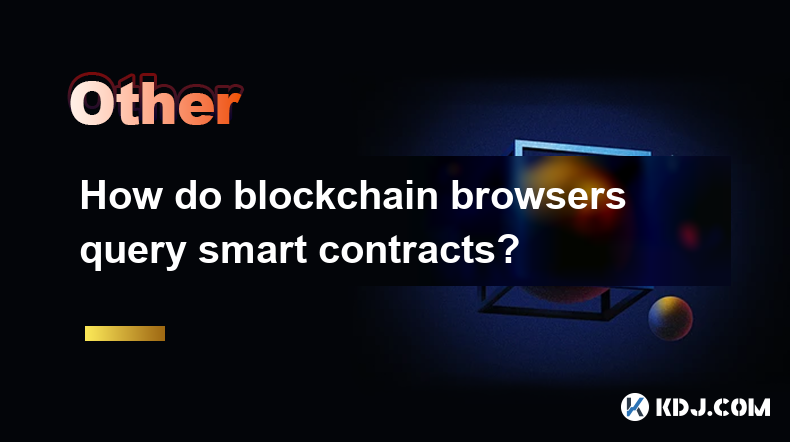
Understanding Smart Contract Interaction
Blockchain browsers, unlike traditional web browsers, are specialized tools designed to interact with and explore the data on a blockchain network. They allow users to view transactions, block information, and most importantly, interact with smart contracts. This interaction involves querying the contract to retrieve information or trigger specific functions within the contract's code. This process leverages the blockchain's inherent transparency and immutability. Understanding how this querying works is crucial for anyone looking to utilize the full potential of decentralized applications (dApps).
The Role of Application Programming Interfaces (APIs)
The primary mechanism for querying smart contracts through a blockchain browser relies on Application Programming Interfaces (APIs). These APIs act as intermediaries, translating user requests into a format understandable by the blockchain network and then translating the network's response back into a human-readable format displayed on the browser. Different blockchain networks have their own specific APIs. Ethereum, for example, uses the JSON-RPC API. This API allows developers to interact with the Ethereum network programmatically.
Querying Smart Contract Data: A Step-by-Step Guide
Let's outline the general steps involved in querying a smart contract using a blockchain browser:
Identify the Contract Address: Every smart contract deployed on a blockchain has a unique address. This address is essential for interacting with the contract. You'll find this address within the blockchain explorer.
Locate the Contract ABI: The Application Binary Interface (ABI) is a crucial piece of information. It's a JSON file that describes the functions and variables within a smart contract. Without the ABI, the browser can't understand how to interact with the contract. Many blockchain explorers provide this information alongside the contract address.
Use a Blockchain Browser: Many blockchain browsers, such as Etherscan for Ethereum or BscScan for Binance Smart Chain, provide user-friendly interfaces to interact with smart contracts. These interfaces often abstract away the complexities of the underlying APIs.
Select the Desired Function: Once you've loaded the ABI, the browser will display a list of functions available within the smart contract. Select the function you wish to query.
Provide Necessary Parameters (if any): Some functions require input parameters. Enter these parameters as specified by the contract's ABI.
Send the Query: After specifying the function and parameters, send the query to the blockchain network. The browser will then interact with the network via its API.
View the Results: The blockchain browser will display the results returned by the smart contract. This could be a simple value, a more complex data structure, or even a transaction receipt.
Understanding Different Query Types
Smart contract queries can be broadly categorized into two types:
Read-only Queries: These queries retrieve information from the smart contract without modifying its state. They are typically used to fetch data like balances, token ownership, or other stored values. These queries are generally faster and cheaper than write operations.
Write Operations (Transactions): These queries modify the smart contract's state. Examples include transferring tokens, updating contract variables, or triggering specific actions within the contract. These require gas fees to be paid, as they involve a transaction on the blockchain.
Advanced Query Techniques
More sophisticated querying might involve using specialized tools or programming languages. Developers often use programming libraries like Web3.js (for Ethereum) to interact with smart contracts programmatically. This allows for more complex interactions and automation. These libraries provide a higher-level abstraction over the underlying APIs, simplifying development. This approach is common for building dApps that interact with smart contracts.
Security Considerations
When querying smart contracts, always exercise caution. Only interact with verified and reputable contracts. Malicious contracts could attempt to steal funds or compromise your data. Always review the contract's code before interacting with it, if possible. Be wary of contracts with unclear or suspicious functionality.
Troubleshooting Common Issues
Sometimes, querying a smart contract can encounter issues. These can include incorrect ABI, network connectivity problems, insufficient gas, or errors within the contract's code itself. Careful examination of error messages provided by the blockchain browser or API is crucial for identifying and resolving these issues. Thorough testing and debugging are essential for reliable interaction with smart contracts.
The Future of Smart Contract Querying
As blockchain technology continues to evolve, so too will the methods for querying smart contracts. We can expect to see more user-friendly interfaces, improved APIs, and more sophisticated tools for interacting with these powerful pieces of code. The development of more efficient querying methods will be crucial for scaling blockchain applications and enabling wider adoption.
Frequently Asked Questions
Q: What is a blockchain browser?
A: A blockchain browser is a specialized tool for exploring and interacting with data on a blockchain network, including smart contracts.
Q: What is an ABI?
A: An Application Binary Interface (ABI) is a JSON file describing the functions and variables within a smart contract, allowing interaction with it.
Q: What are read-only queries?
A: Read-only queries retrieve data from a smart contract without modifying its state. They are generally faster and cheaper than write operations.
Q: What are write operations?
A: Write operations modify the smart contract's state, requiring gas fees as they involve blockchain transactions.
Q: How do I find a smart contract's address?
A: The contract address is usually available on the blockchain explorer associated with the network where the contract is deployed.
Q: What happens if I use the wrong ABI?
A: Using the wrong ABI will result in errors or unexpected behavior when trying to interact with the smart contract. The browser won't be able to correctly interpret the contract's functions.
Q: Are there security risks involved in querying smart contracts?
A: Yes, there are security risks. Always verify the contract's legitimacy and carefully review its code before interacting with it to avoid malicious contracts.
Q: What programming languages can be used for querying smart contracts?
A: Various languages can be used, often through libraries like Web3.js (for Ethereum) which interact with blockchain APIs. Solidity is also used for writing smart contracts themselves.
Q: What are gas fees?
A: Gas fees are transaction fees paid to miners/validators for processing write operations (transactions) on the blockchain. They are required for write operations on smart contracts.
Disclaimer:info@kdj.com
The information provided is not trading advice. kdj.com does not assume any responsibility for any investments made based on the information provided in this article. Cryptocurrencies are highly volatile and it is highly recommended that you invest with caution after thorough research!
If you believe that the content used on this website infringes your copyright, please contact us immediately (info@kdj.com) and we will delete it promptly.
- Expect “Strong Bullish Rally” for SUI if This Key Resistance Breaks: Top Analyst
- 2025-04-01 23:15:11
- MIND of Pepe (MIND) Emerges as a Contender in the Meme Coin Arena, Aiming to Outperform Dogecoin (DOGE) and Pepe (PEPE)
- 2025-04-01 23:15:11
- WAIB Summit Monaco 2025, the First and Largest Web3 Event in Europe
- 2025-04-01 23:10:12
- 5 Best Altcoins to Buy Now as Bitcoin (BTC) Market Cycle Enters a New Phase
- 2025-04-01 23:10:12
- Rexas Finance Surpasses Shiba Inu – Real-World Assets Drive Investor Confidence!
- 2025-04-01 23:05:12
- Kernel DAO (KERNEL) is a Revolutionary Restaking Protocol Operating on the BNB Chain
- 2025-04-01 23:05:12
Related knowledge
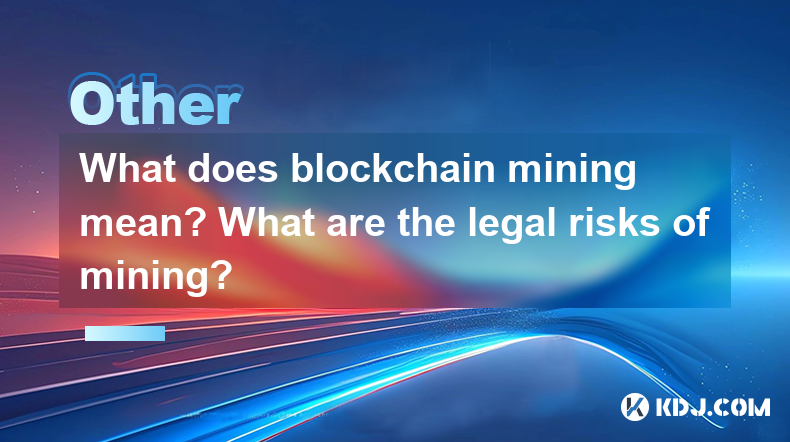
What does blockchain mining mean? What are the legal risks of mining?
Mar 31,2025 at 05:07pm
Blockchain mining is the process by which transactions are verified and added to the public ledger, known as the blockchain. Miners use powerful computers to solve complex mathematical problems, which, once solved, allow them to add a block of transactions to the blockchain. In return, miners are rewarded with cryptocurrency, typically Bitcoin. This pro...
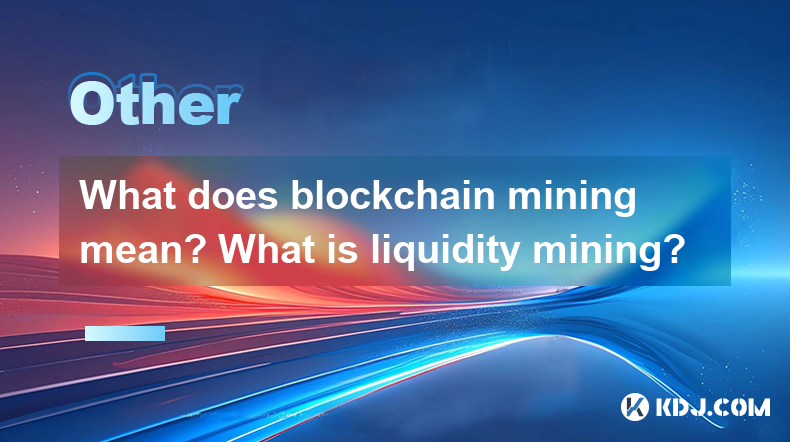
What does blockchain mining mean? What is liquidity mining?
Apr 01,2025 at 12:07am
What is Blockchain Mining?Blockchain mining is a critical process in the world of cryptocurrencies, particularly for networks like Bitcoin and Ethereum. It involves the use of computational power to solve complex mathematical problems, which in turn validates transactions and adds them to the blockchain. Miners are incentivized through rewards, typicall...
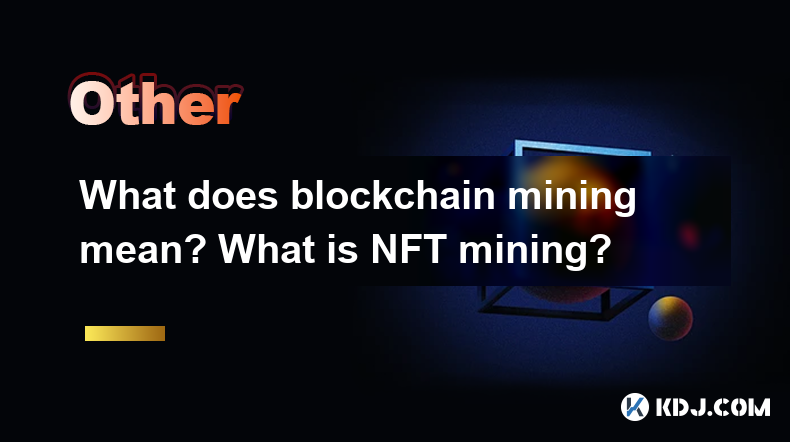
What does blockchain mining mean? What is NFT mining?
Mar 31,2025 at 04:07pm
Blockchain mining is a crucial process in the world of cryptocurrencies, particularly for networks like Bitcoin and Ethereum. It involves verifying transactions and adding them to the blockchain, a decentralized ledger. Miners use powerful computers to solve complex mathematical problems, which, when solved, allow them to add a block of transactions to ...
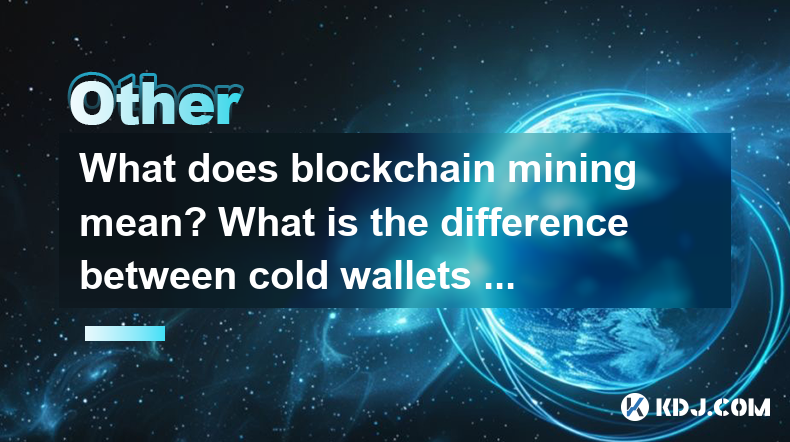
What does blockchain mining mean? What is the difference between cold wallets and hot wallets for mining?
Apr 01,2025 at 07:56am
Blockchain mining is a critical process in the world of cryptocurrencies. It involves verifying transactions and adding them to the blockchain, a decentralized ledger. Miners use powerful computers to solve complex mathematical problems, which, when solved, allow them to add a block of transactions to the blockchain. In return, miners are rewarded with ...
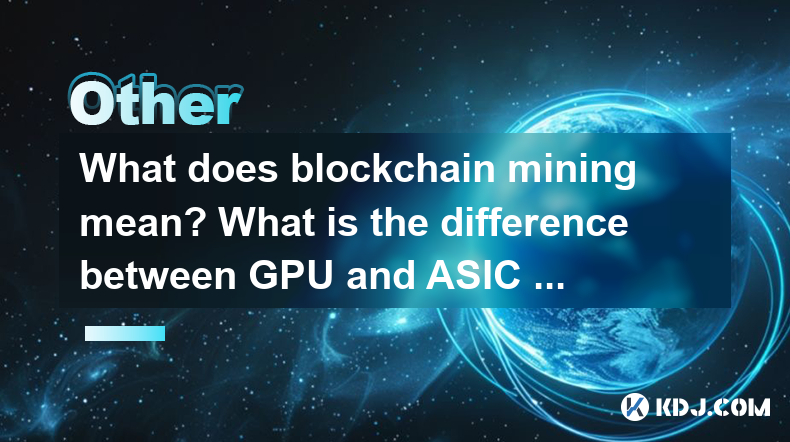
What does blockchain mining mean? What is the difference between GPU and ASIC mining?
Apr 01,2025 at 11:56am
Blockchain mining is a crucial process in the world of cryptocurrencies, particularly for networks like Bitcoin and Ethereum. At its core, mining involves solving complex mathematical problems to validate transactions and add them to the blockchain, a decentralized ledger. Miners compete to solve these problems, and the first to succeed is rewarded with...
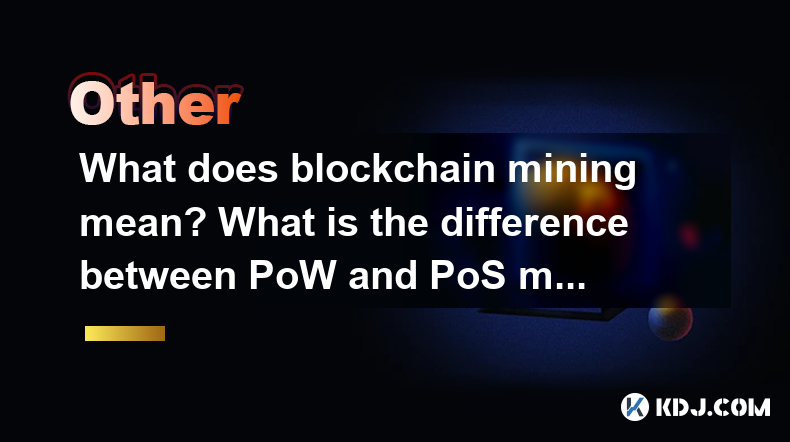
What does blockchain mining mean? What is the difference between PoW and PoS mining?
Apr 01,2025 at 10:07pm
What is Blockchain Mining?Blockchain mining is a crucial process in the world of cryptocurrencies, serving as the backbone for maintaining and securing blockchain networks. At its core, mining involves solving complex mathematical problems to validate transactions and add them to the blockchain. This process not only ensures the integrity and security o...

What does blockchain mining mean? What are the legal risks of mining?
Mar 31,2025 at 05:07pm
Blockchain mining is the process by which transactions are verified and added to the public ledger, known as the blockchain. Miners use powerful computers to solve complex mathematical problems, which, once solved, allow them to add a block of transactions to the blockchain. In return, miners are rewarded with cryptocurrency, typically Bitcoin. This pro...

What does blockchain mining mean? What is liquidity mining?
Apr 01,2025 at 12:07am
What is Blockchain Mining?Blockchain mining is a critical process in the world of cryptocurrencies, particularly for networks like Bitcoin and Ethereum. It involves the use of computational power to solve complex mathematical problems, which in turn validates transactions and adds them to the blockchain. Miners are incentivized through rewards, typicall...

What does blockchain mining mean? What is NFT mining?
Mar 31,2025 at 04:07pm
Blockchain mining is a crucial process in the world of cryptocurrencies, particularly for networks like Bitcoin and Ethereum. It involves verifying transactions and adding them to the blockchain, a decentralized ledger. Miners use powerful computers to solve complex mathematical problems, which, when solved, allow them to add a block of transactions to ...

What does blockchain mining mean? What is the difference between cold wallets and hot wallets for mining?
Apr 01,2025 at 07:56am
Blockchain mining is a critical process in the world of cryptocurrencies. It involves verifying transactions and adding them to the blockchain, a decentralized ledger. Miners use powerful computers to solve complex mathematical problems, which, when solved, allow them to add a block of transactions to the blockchain. In return, miners are rewarded with ...

What does blockchain mining mean? What is the difference between GPU and ASIC mining?
Apr 01,2025 at 11:56am
Blockchain mining is a crucial process in the world of cryptocurrencies, particularly for networks like Bitcoin and Ethereum. At its core, mining involves solving complex mathematical problems to validate transactions and add them to the blockchain, a decentralized ledger. Miners compete to solve these problems, and the first to succeed is rewarded with...

What does blockchain mining mean? What is the difference between PoW and PoS mining?
Apr 01,2025 at 10:07pm
What is Blockchain Mining?Blockchain mining is a crucial process in the world of cryptocurrencies, serving as the backbone for maintaining and securing blockchain networks. At its core, mining involves solving complex mathematical problems to validate transactions and add them to the blockchain. This process not only ensures the integrity and security o...
See all articles























































































